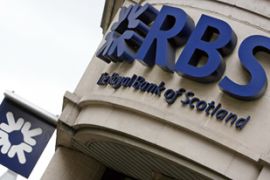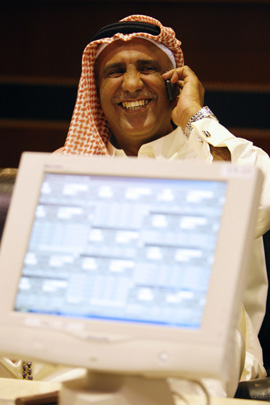European banks set for rescue deal
Most markets rally as governments announce plans to shore up leading banks.

Gordon Brown, the British prime minister, described the move as “unprecedented” but essential.
“The government cannot just leave people on their own to be buffeted about,” he said.
Markets soar
On the back of the treasury announcement, London’s FTSE 100 climbed by 5.50 per cent to 3,974.32 points shortly after the start of trading.
Wall Street recovered early on Monday as investors rushed into stocks after eight sessions of devastating losses. The major stock indexes rose more than four per cent, including the Dow Jones industrials, which at times jumped more than 400 points.
Germany’s DAX rose by five per cent in early trading, while the French stock market rose by 4.52 per cent.
 |
| Gulf markets have risen after governments pledged to guarantee deposits [Reuters] |
Stock markets in oil-rich Gulf countries also rallied on Monday, after authorities in the region pledged to guarantee bank deposits for the next three years.
Dubai’s stock markets rose by 6.6 per cent, while Abu Dhabi’s increased by almost six per cent. Qatar’s stock exchange surged 7.4 per cent in early trading.
But in a sign of continuing instaibility, Iceland’s stock market remained closed on Monday, in the wake of a devastating credit crunch that has left the island on the verge of bankruptcy.
The stock-market rally came after an announcement on Sunday by Nicolas Sarkozy, the French president, that leaders from the 15-member Eurozone had reached an agreement to inject capital into banks across the continent.
He said on Monday that his government will make up to 320bn euros available for bank guarantees to run until 2009.
“Nothing will be spared to prevent the crisis getting any worse,” Sarkozy said.
Germany’s rescue plan proposes a 80bn euro capital injection to its banks and 400bn euros in loan guarantees, a finance ministry statement said on Monday.
Joes Luis Zapatero, Spain’s prime minister, said that the government would cover up to 100bn euros in inter-bank loans, but stopped short of announcing a recapitalisation scheme.
British plan details
Under the British government plan announced on Monday, RBS stands to increase its capital by £20bn.
The UK government will use taxpayers’ money to buy £5bn in preference shares and underwrite a further £15bn.
HBOS and Lloyds TSB will also take part in the government scheme “upon successful merger”, the British treasury said.
HBOS will take £11.5bn, including £3bn in preference shares, while Lloyds TSB will receive £5.5bn, with £1bn of that amount in preference shares.
Dividends on ordinary shares in the three banks will not be paid until the preference shares taken by the British government are repaid.
Barclays exception
But Barclays, another bank which had been expected to agree to government intervention, said on Monday that it would aim to raise £6.5bn through private investment.
Banks participating in the scheme will attempt to sell ordinary shares to existing investors, backed up by the government.
The government will buy up any shares left unsold.
The government could also provide capital in return for preference shares, which could pay an annual dividend of about 10 per cent.
The scheme means that the government could become a majority investor in RBS and HBOS/Lloyds TSB, should the latter two banks merge.
Fred Goodwin, chief executive of RBS, will step down as head of the ailing banks and will be replaced by Stephen Hester, chief executive for British Land.
Concerted effort
Marcus Cranny, an analyst from MF Global Spreads, told Al Jazeera that government intervention in European banks is a concerted effort to ensure their long-term health.
“Essentially [European leaders] are making sure that the banking system continues, and that lending continues,” he said.
“The most important aspect in all of this is that the banks will begin to lend to one another – [the lack of inter-bank lending] is what has been strangling the market. Once banks begin to lend to one another, we can then take a step forward.
“This is what we need to see the Americans replicate – to guarantee bank-to-bank lending. If that begins, the price at which banks borrow from one another will come down. That will make the system calmer and make it work much more fluidly.”